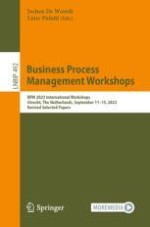2024 | OriginalPaper | Chapter
Predictive Analytics for Object-Centric Processes: Do Graph Neural Networks Really Help?
Authors : Riccardo Galanti, Massimiliano de Leoni
Published in: Business Process Management Workshops
Publisher: Springer Nature Switzerland
Activate our intelligent search to find suitable subject content or patents.
Select sections of text to find matching patents with Artificial Intelligence. powered by
Select sections of text to find additional relevant content using AI-assisted search. powered by
